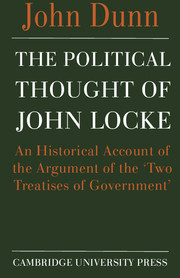 The Political Thought of John Locke
The Political Thought of John Locke 5 - The Two Treatises and Exclusion
Published online by Cambridge University Press: 05 April 2012
Summary
In the late 1670s the English political community was bitterly divided on a number of different issues. The lines of division did not run in quite the same places from one issue to another and individual politicians on occasion crossed the lines for distinctly private advantages. But between 1679 and 1681 political attitudes and activities came increasingly to polarize around two consolidated political groups, each with its own more or less systematic ideology. The names applied to the two groups at the time, Whigs and Tories, the Court and Country parties, are in themselves at least as misleading as they are revealing. The leaders of the Country party were struggling self-consciously to be admitted to office under the crown and the initial leader of the Court party, the king's chief minister, the Earl of Danby, was a robust Protestant who certainly believed himself to have the interests of the country at heart and supposed himself to be exercising his office in accordance with the constitution. The ideology of the Country party at times sounded stirringly populist but few of its leaders showed in practice much inclination for a re-enactment of 1649.
Perhaps the most authoritative statement of the Tory ideology was held to be Sir Robert Filmer's masterwork Patriarcha. Yet such an unyielding upholder of the royal prerogative as the Marquis of Halifax thought even Sir William Temple's mild patriarchalism injudicious as propaganda and can only have regarded Filmer himself as a rather laboured joke.
- Type
- Chapter
- Information
- The Political Thought of John LockeAn Historical Account of the Argument of the 'Two Treatises of Government', pp. 43 - 57Publisher: Cambridge University PressPrint publication year: 1969


